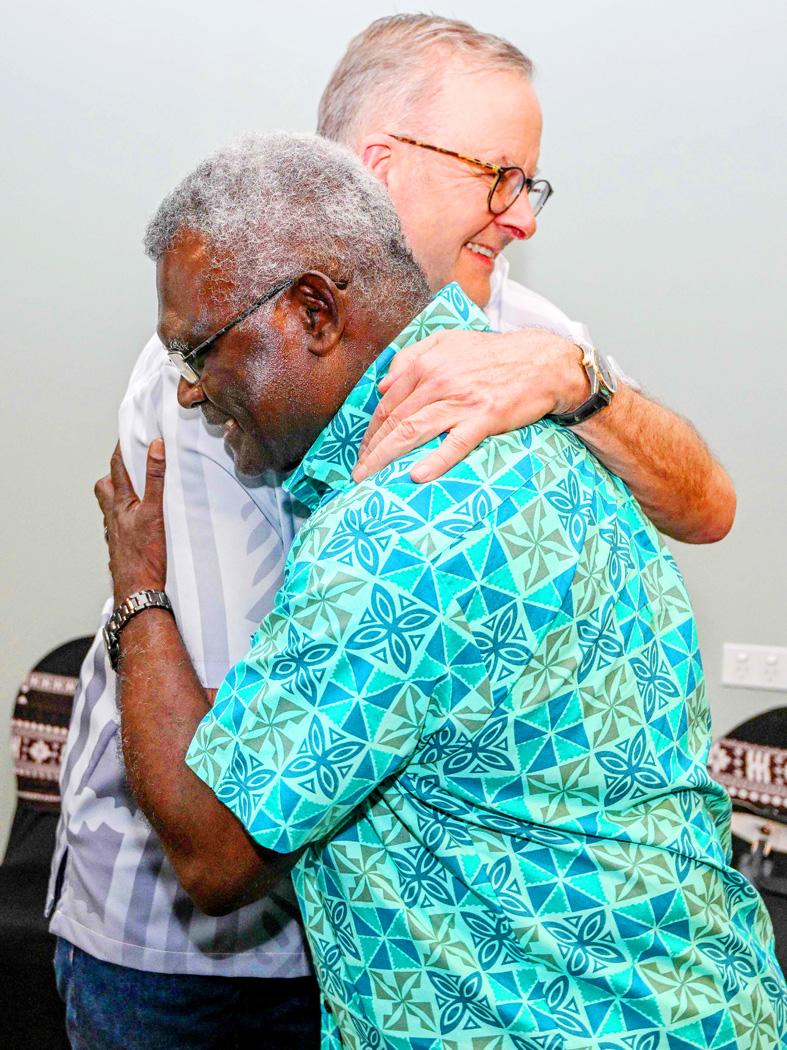Solomon Islands Prime Minister Manasseh Sogavare has guaranteed there would never be a Chinese military base in his country, saying that any such deal with Beijing would undermine regional security, make the Pacific state an “enemy,” and “put our country and our people as targets for potential military strikes.”
He has also said that Australia remains the “security partner of choice” for Solomon Islands and he would only call on China to send security personnel to the country if there was a “gap” that Canberra could not meet.
Speaking exclusively to the Guardian, Radio New Zealand and Solomon Islands Broadcasting Corp in his first media interview since signing the controversial security deal with China earlier this year, Sogavare said it was time for the world to “trust us.”

Photo: AFP
“Let me assure you all again, there is no military base, nor any other military facility, or institutions in the agreement. And I think that’s a very important point that we continue to reiterate to the family in the region,” he said.
News of the deal with China sparked huge concern among Western countries, particularly language in the text saying China would be permitted to “make ship visits.”
However, Sogavare pushed back against claims it would lead to a military base in the country, which lies less than 2,000km from Australia’s east coast.
“I have said it before and I will say it again, that is not in someone’s interest, nor the interest of the region for any military base, to be established in any Pacific island country, let alone Solomon Islands,” he said.
“I think the reason is simple; the reason is regionalism, the moment we establish a foreign military base, we immediately become an enemy. And we also put our country and our people as targets for potential military strikes,” he said.
Sogavare added that Chinese security personnel would only be invited to the Solomon Islands by the Solomon Islands government if Australia could not meet the requests for security assistance from the government.
“If there is any gap, we will not allow our country to go down the drain. If there is a gap, we will call on support from China, but we’ve made it very clear to the Australians, and many times when we have this conversation with them, that they are a partner of choice ... when it comes to security issues in the region, we will call on them first,” he said.
However, the assurances seem at odds with comments made by Sogavare last week, in which he praised China as a “worthy partner,” while saying relationships with some countries “at times can sour,” in an apparent reference to Australia.
He also said he wanted China to play a permanent role in training police in his country, and welcomed donations of police vehicles and drones from Beijing.

Auckland rang in 2026 with a downtown fireworks display launched from New Zealand’s tallest structure, Sky Tower, making it the first major city to greet the new year at a celebration dampened by rain, while crowds in Taipei braved the elements to watch Taipei 101’s display. South Pacific countries are the first to bid farewell to 2025. Clocks struck midnight in Auckland, with a population of 1.7 million, 18 hours before the famous ball was to drop in New York’s Times Square. The five-minute display involved 3,500 fireworks launched from the 240m Sky Tower. Smaller community events were canceled across New Zealand’s

The Ministry of Foreign Affairs (MOFA) yesterday said it is closely monitoring developments in Venezuela, and would continue to cooperate with democratic allies and work together for regional and global security, stability, and prosperity. The remarks came after the US on Saturday launched a series of airstrikes in Venezuela and kidnapped Venezuelan President Nicolas Maduro, who was later flown to New York along with his wife. The pair face US charges related to drug trafficking and alleged cooperation with gangs designated as terrorist organizations. Maduro has denied the allegations. The ministry said that it is closely monitoring the political and economic situation

‘SLICING METHOD’: In the event of a blockade, the China Coast Guard would intercept Taiwanese ships while its navy would seek to deter foreign intervention China’s military drills around Taiwan this week signaled potential strategies to cut the nation off from energy supplies and foreign military assistance, a US think tank report said. The Chinese People’s Liberation Army (PLA) conducted what it called “Justice Mission 2025” exercises from Monday to Tuesday in five maritime zones and airspace around Taiwan, calling them a warning to “Taiwanese independence” forces. In a report released on Wednesday, the Institute for the Study of War said the exercises effectively simulated blocking shipping routes to major port cities, including Kaohsiung, Keelung and Hualien. Taiwan would be highly vulnerable under such a blockade, because it

UNRELENTING: China attempted cyberattacks on Taiwan’s critical infrastructure 2.63 million times per day last year, up from 1.23 million in 2023, the NSB said China’s cyberarmy has long engaged in cyberattacks against Taiwan’s critical infrastructure, employing diverse and evolving tactics, the National Security Bureau (NSB) said yesterday, adding that cyberattacks on critical energy infrastructure last year increased 10-fold compared with the previous year. The NSB yesterday released a report titled Analysis on China’s Cyber Threats to Taiwan’s Critical Infrastructure in 2025, outlining the number of cyberattacks, major tactics and hacker groups. Taiwan’s national intelligence community identified a large number of cybersecurity incidents last year, the bureau said in a statement. China’s cyberarmy last year launched an average of 2.63 million intrusion attempts per day targeting Taiwan’s critical